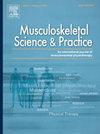患者特定功能量表--巴西,作为慢性非特异性腰背痛患者功能评估的工具:结构效度(假设检验和结构效度)和重复测试可靠性
IF 2.2
3区 医学
Q1 REHABILITATION
引用次数: 0
摘要
目的是评估巴西患者特异性功能量表(PSFS-B)在非特异性慢性腰背痛患者中的有效性和可靠性。研究人员对 101 名患有慢性非特异性腰背痛的志愿者进行了访谈,并要求他们填写 PSFS-B 问卷和 Oswestry Disability Index-Brazil 2.0 参考问卷。Oswestry Disability Index-Brazil 2.0 是用于评估腰椎功能性残疾的标准化工具。一周后使用相同的工具进行新的评估(随访)。COSMIN 检查表被用作指南。评估患者时使用了两份问卷:巴西患者特定功能量表(PSFS-Br)和巴西奥斯韦特里残疾指数 2.0(ODI-Br)。对数据进行了分析,以评估构建有效性(假设检验和结构有效性)、内部一致性和测试-再测可靠性。采用的统计方法包括皮尔逊相关系数、确证因子分析、克朗巴赫α和类内相关系数。在假设检验(r = -0.691 和 r = -0.754)和结构效度(比较拟合指数(0.986)、塔克-刘易斯指数(0.958)、近似均方根误差(0.194)和标准化均方根残差(0.134))方面,巴西患者特定功能量表与 ODI-Br 的结果呈中度负相关。此外,该工具还表现出极佳的内部一致性(α = 0.951)和测试-再测试可靠性(类内相关系数 = 0.978),并通过布兰德-阿尔特曼图(0.125)得到进一步验证。总之,巴西患者特异性功能量表是评估和随访非特异性慢性腰背痛患者的有效而可靠的工具。本文章由计算机程序翻译,如有差异,请以英文原文为准。
The Patient Specific Functional Scale - Brazil as an instrument for the functional assessment of patients with chronic non-specific low back pain: Construct validity (hypothesis testing and structural validity) and test-retest reliability
The objective was to assess the validity and reliability of the Patient-Specific Functional Scale-Brazil (PSFS-B) in patients with non-specific chronic low back pain. A methodological study was conducted, and 101 volunteers with chronic non-specific low back pain were interviewed and asked to complete the PSFS-B questionnaire and the Oswestry Disability Index-Brazil 2.0 reference questionnaire. The Oswestry Disability Index-Brazil 2.0 is a standardized tool used to assess functional disability of the lumbar spine. A new assessment (follow-up) was conducted one week later using the same instruments. The COSMIN checklist was utilized as a guide. Two questionnaires were employed to assess patients: the Patient-Specific Functional Scale-Brazil (PSFS-Br) and the Oswestry Disability Index-Brazil 2.0 (ODI-Br). Data were analyzed to assess construct validity (hypothesis testing and structural validity), internal consistency, and test-retest reliability. The statistical methods employed included Pearson's correlation coefficient, confirmatory factorial analysis, Cronbach's alpha, and intraclass correlation coefficient. The results of the Patient-Specific Functional Scale-Brazil demonstrated a moderate negative correlation with the ODI-Br in hypothesis testing (r = −0.691 and r = −0.754) and in structural validity (Comparative Fit Index (0.986), Tucker-Lewis Index (0.958), Root Mean Square Error of Approximation (0.194), and Standardized Root Mean Square Residual (0.134). Furthermore, the instrument demonstrated excellent internal consistency (α = 0.951) and test-retest reliability (intraclass correlation coefficient = 0.978), and was additionally validated by the Bland-Altman plot (0.125). In conclusion, the Patient-Specific Functional Scale-Brazil is a valid and reliable tool for the evaluation and follow-up of patients with non-specific chronic low back pain.
求助全文
通过发布文献求助,成功后即可免费获取论文全文。
去求助
来源期刊

Musculoskeletal Science and Practice
Health Professions-Physical Therapy, Sports Therapy and Rehabilitation
CiteScore
4.10
自引率
8.70%
发文量
152
审稿时长
48 days
期刊介绍:
Musculoskeletal Science & Practice, international journal of musculoskeletal physiotherapy, is a peer-reviewed international journal (previously Manual Therapy), publishing high quality original research, review and Masterclass articles that contribute to improving the clinical understanding of appropriate care processes for musculoskeletal disorders. The journal publishes articles that influence or add to the body of evidence on diagnostic and therapeutic processes, patient centered care, guidelines for musculoskeletal therapeutics and theoretical models that support developments in assessment, diagnosis, clinical reasoning and interventions.
 求助内容:
求助内容: 应助结果提醒方式:
应助结果提醒方式:


